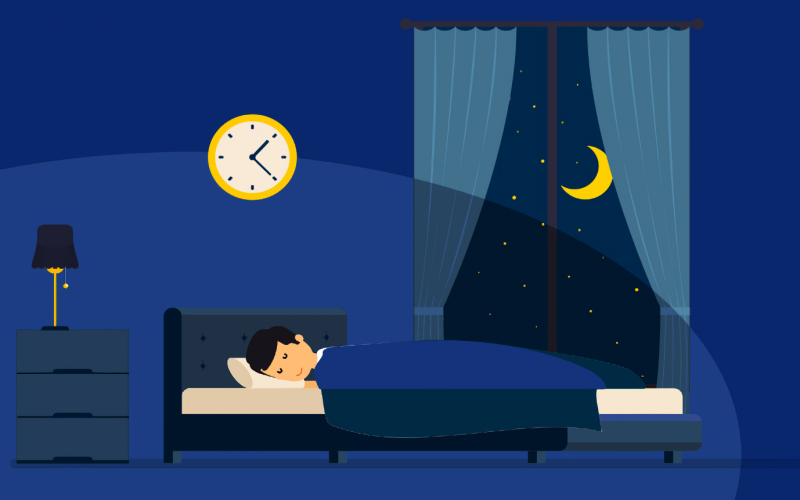Sleep is often overlooked in the hustle and bustle of modern life, but its importance for mental health cannot be overstated. As society becomes increasingly fast-paced and technology-driven, sleep is frequently sacrificed in favor of productivity and entertainment. However, the consequences of inadequate sleep extend far beyond mere fatigue. This article explores the intricate relationship between sleep and mental health, highlighting the critical role that quality sleep plays in maintaining emotional and psychological well-being.
The Biological Basis of Sleep
To understand why sleep is so vital for mental health, it is essential to grasp the biological mechanisms that regulate sleep. The human body operates on a circadian rhythm, a 24-hour internal clock that cycles between sleepiness and alertness at regular intervals. This rhythm is influenced by external cues such as light and temperature, and it regulates the release of hormones like melatonin, which promotes sleep.
During sleep, the brain undergoes a series of restorative processes. These include the consolidation of memories, the removal of toxins, and the regulation of various neurotransmitters that affect mood and cognitive function. Sleep is divided into several stages, including rapid eye movement (REM) and non-REM sleep, each of which serves distinct functions. REM sleep, for example, is crucial for emotional regulation and memory consolidation.
The Impact of Sleep on Mental Health
Emotional Stability
One of the most immediate effects of sleep deprivation is emotional instability. Lack of sleep can lead to irritability, mood swings, and heightened emotional reactions. Studies have shown that individuals who do not get enough sleep are more likely to experience negative emotions such as anger, sadness, and frustration. Conversely, adequate sleep helps regulate emotions, making it easier to cope with stress and maintain a positive outlook on life.
Cognitive Function
Sleep is also essential for cognitive functions such as attention, problem-solving, and decision-making. When we are sleep-deprived, our ability to think clearly and make sound decisions is compromised. This can lead to poor judgment and increased risk-taking behavior, which can have far-reaching consequences for both personal and professional life.
Risk of Mental Health Disorders
Chronic sleep deprivation has been linked to a higher risk of developing mental health disorders such as depression, anxiety, and bipolar disorder. For instance, individuals with insomnia are ten times more likely to develop depression compared to those who sleep well. Similarly, people with sleep disorders are at a higher risk of experiencing anxiety symptoms. The relationship between sleep and mental health is bidirectional, meaning that poor sleep can contribute to mental health issues, and mental health issues can, in turn, disrupt sleep.

Sleep Disorders and Mental Health
Several sleep disorders can have a profound impact on mental health. Some of the most common include:
Insomnia
Insomnia is characterized by difficulty falling asleep, staying asleep, or waking up too early. It is often accompanied by feelings of fatigue, irritability, and difficulty concentrating. Chronic insomnia can lead to severe mental health issues, including depression and anxiety.
Sleep Apnea
Sleep apnea is a condition where breathing repeatedly stops and starts during sleep. This leads to fragmented sleep and reduced oxygen levels in the blood. People with sleep apnea often experience excessive daytime sleepiness, irritability, and difficulty concentrating. The condition has also been linked to an increased risk of depression and anxiety.
Restless Legs Syndrome (RLS)
Restless Legs Syndrome is a neurological disorder characterized by an uncontrollable urge to move the legs, usually due to uncomfortable sensations. This can make it difficult to fall asleep and stay asleep, leading to sleep deprivation and its associated mental health issues.
Strategies for Improving Sleep and Mental Health
Given the significant impact of sleep on mental health, it is crucial to adopt strategies that promote good sleep hygiene. Here are some practical tips:
Establish a Routine
Going to bed and waking up at the same time every day helps regulate the body’s internal clock. Consistency in sleep patterns can improve the quality of sleep and, by extension, mental health.
Create a Sleep-Friendly Environment
The sleep environment plays a crucial role in the quality of sleep. A dark, quiet, and cool room can promote better sleep. Investing in a comfortable mattress and pillows can also make a significant difference.
Limit Screen Time
Exposure to screens before bedtime can interfere with the production of melatonin, making it harder to fall asleep. It is advisable to limit screen time at least an hour before bed and consider using blue light filters if screen use is necessary.
Practice Relaxation Techniques
Techniques such as deep breathing, meditation, and progressive muscle relaxation can help calm the mind and prepare the body for sleep. These practices can also reduce stress and anxiety, further improving mental health.
Avoid Stimulants
Consuming stimulants such as caffeine and nicotine close to bedtime can interfere with sleep. It is best to avoid these substances in the hours leading up to sleep.
Seek Professional Help
If sleep problems persist despite adopting good sleep hygiene practices, it may be necessary to seek professional help. Cognitive-behavioral therapy for insomnia (CBT-I) has been shown to be effective in treating sleep disorders and improving mental health.
Conclusion
Sleep is a fundamental component of overall health, and its impact on mental health is profound. From emotional stability to cognitive function and the risk of mental health disorders, the quality and quantity of sleep play a pivotal role in our well-being. By understanding the importance of sleep and adopting strategies to improve sleep hygiene, we can significantly enhance our mental health and lead more fulfilling lives. Prioritizing sleep is not a luxury but a necessity for maintaining emotional and psychological balance in our increasingly demanding world.










